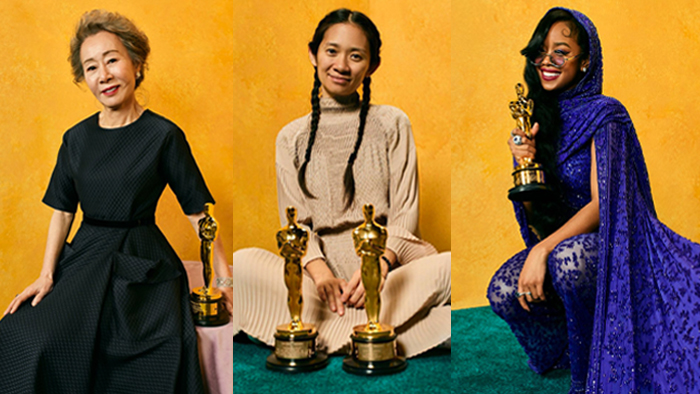Over a year after the historic wins at the 92nd Academy Awards, history has once again been made as Asian women took home major awards during last night’s ceremony.
Chloé Zhao, a Chinese-born filmmaker, picked up two wins for her critically acclaimed “Nomadland,” including Best Picture, for which she shared with her fellow producers, and Best Director. She became the first woman of color, as well as the first Asian woman, to be awarded Best Director and is only the second woman after Kathryn Bigelow to win in the category.
Her win comes amidst anti-Asian racism in the United States but during her acceptance speech, she reminds everyone of an adage she grew up with: people at birth are inherently good. “I have always found goodness in the people I meet,” Zhao says, moving to pick up her award. “This is for anyone who has the faith and the courage to hold onto the goodness in themselves and to hold onto the goodness in each other no matter how difficult it is to do that.”
But that wasn’t the only landmark win of the evening. Awards season favorite, Youn Yuh-Jung, won the Best Supporting Actress award for her role as Soon-Ja, the loving halmeoni “Minari,” becoming the first Korean to do so. This comes after her wins at the British Academy Film Awards (BAFTAs) and the Screen Actors Guild Awards (SAG Awards) earlier in the year.
She began her acceptance speech by fangirling over Brad Pitt, who presented the award to her, and forgiving everyone who has mispronounced her name before giving her round of thanks to the Academy, the “Minari” family, her two sons and the late director who cast her in her first film role.
Youn also honored the other nominees by saying her win was based on luck. “I don’t believe in competition. How can I win over Glenn Close? … All the five nominees, we were the winner for the different movie, we play the different role. So we cannot compete with each other. Tonight I’m here because … I think I’m luckier than you.”
Finally, Gabriella Wilson, known professionally as H.E.R., became the first Filipina to win Best Original Song for her part in writing “Fight for You” from “Judas and the Black Messiah.” She is the second person of Filipino descent to win the award after Robert Lopez for “Frozen”’s “Let It Go” in 2014.
The half-Filipino songstress thanked the Academy as well as her co-writers in her acceptance speech and expressed the importance of musicians and filmmakers in telling honest stories. “Musicians, filmmakers, I believe we have an opportunity and responsibility … to tell the truth and to write history the way that it was and how it connects us to today,” she preaches. “Knowledge is power, music is power and as long as I’m standing, I’m always going to fight for us, I’m always going to fight for my people and fight for what’s right.”
In addition to the winners above, several other AAPI-helmed films were honored by the Academy. “Minari,” following a South Korean family’s move to rural Arkansas during the 1980s, was nominated in six categories including Best Picture, Best Actor for Steven Yeun and Best Director and Best Original Screenplay for Director Lee Isaac Chung. Pakistani actor Riz Ahmed was nominated for Best Actor for his role in “Sound of Metal” as Ruben Stone, a metal drummer who loses his hearing. And “Over the Moon,” a story about a young girl who flies a rocket to the moon to meet the goddess Chang’e, was nominated for Best Animated Feature.
These accolades follow last year’s significant wins by South Korean director Bong Joon Ho, for his now-iconic film “Parasite,” and director and screenwriter Taika Waititi, the first person of Māori descent to win Best Adapted Screenplay for the Nazi satire “Jojo Rabbit.” This year’s accomplishments are not only a triumph for the AAPI community to see Asians honored for the second year in a row, but are also a triumph for the women that are at the forefront of these milestones.








